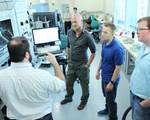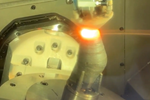Beyond Conformal Cooling: Uniform Thermal Surface Control
The concept leverages principles of conformal cooling to enable even more precise temperature control.
Additive manufacturing in metals has already proven itself to be a valuable tool for moldmakers. Conformal cooling via additively manufactured channels that can be placed exactly where needed helps to short injection molding times, improve part quality, and lengthen the lifespans of mold cores and inserts.
Baker Industries is taking that idea and running with it. The large-scale manufacturer and fabricator is now using what it calls Uniform Thermal Surface Control, a concept that builds on the same principles of conformal cooling to keep the temperature of the tool uniform throughout. By applying heat via channels inside tooling, it is possible to control areas of temperature individually to maintain a set temperature throughout. The strategy applies to injection as well as compression molding, and is also relevant for rapid heat, rapid cool (RHRC) applications.
The example pictured above is one illustration of a possible application: a deep rib detail in a molded part. It would not have been possible to get heating to this area without internal channels. But thanks to additive manufacturing, Baker was able to add channels inside the tooling to help regulate the temperature while this feature was formed.
Similar to conformal cooling, the USTC strategy helps to reduce cycle times and avoid warp and sink problems. It also promotes better part and surface quality, as well as structural integrity for stronger, longer-lasting parts, according to Baker.

.jpg;width=70;height=70;mode=crop)










